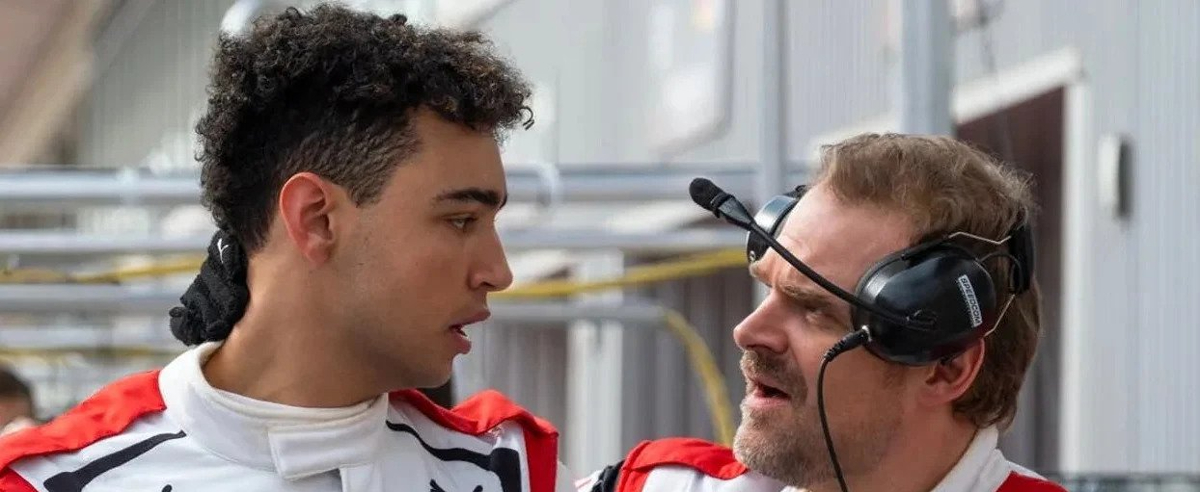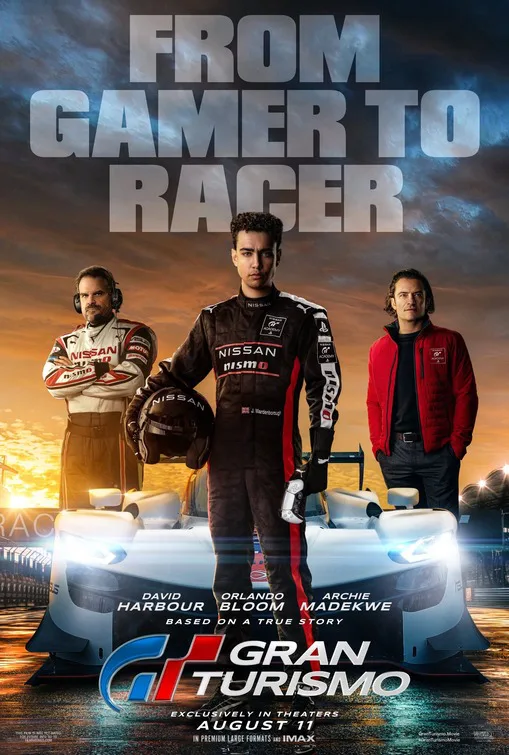Certain films are so close to being good, so close to achieving a rare level of brilliance, your anger springs from said work not reaching those heights. Director Neill Blomkamp’s “Gran Turismo,” a crowd-pleasing, genre-bending sports drama, approaches wonder with an odd tepidness; it maneuvers around any modicum of character development by taking all-too simple routes and swerves away from formal experimentation, opting instead for simple enjoyment.
And yet, I can’t say I wasn’t invested in every race, lap, and turn. Nor can I say the climax didn’t successfully tug my heart toward an emotional response as the intrepid Jann Mardenborough (Archie Madekwe), a teenager who rose from gamer to real-life car racer, passed the finish line.
“Gran Turismo” is an uncommon yet familiar biopic, a video game-inspired narrative with unique strengths and recurrent weaknesses. For one, as Mardenborough likes to say, the property the film takes inspiration from isn’t a game; it’s a simulator. Players can customize vehicles to startling specific details through a seemingly infinite library of parts to imitate a range of makes and models that rival professional drivers (Blomkamp attempts to visualize such realism by having transparent VFX cars envelop Mardenborough whenever he plays).
Marketing extraordinaire Danny Moore (Orlando Bloom) knows the potentiality of such skill: He goes to GT proposing a competition in which the top seven gamers will train to become an actual racer for the Nissan team. He also recruits seasoned veteran crew chief and former driver Jack Salter (David Harbour) as a trainer. Moore’s venture brings heavy risk. And yet, when Jack asks Moore what the marketer gets out of this, Moore doesn’t have an answer. Despite Bloom’s inspired take, the wobbly, incomprehensible motivations of Moore only offer frustration.
Mardenborough’s desires are clearer cut: He wants to work on real cars. His father, Steve (Djimon Hounsou), a former professional footballer presently relegated to menial jobs, wants his son to be practical, lest he end up like his old man, filled with broken dreams. We don’t get much screen time or interiority from any Mardenborough family member. He has a doting, understanding mother (Geri Halliwell) and a partying immature brother (Daniel Puig), but they only fulfill the basic duty of filling out morsels of screen time. At a party, Mardenborough meets Audrey (Maeve Courtier-Lilley), whom he’ll keep up vicariously via Instagram. It’s disappointing that she never evolves narratively beyond being the dream girl on Mardenborough’s screen.
The young gamers turned drivers in the GT Academy are similarly thinly sketched. They’re inchoate obstacles who, once again, merely round out the biopic’s run time. The Academy’s more pressing narrative function is to serve as a site for Mardenborough and Jack’s budding rapport. The latter is skeptical that these keyboard warriors possess the physical and competitive acumen to become professionals. Jason Hall and Zach Baylin’s script plays an exhausting game of keep-away about Jack’s tragic backstory (are we supposed to believe that Mardenborough, a perpetually online teenager, didn’t Google his trainer?).
“Gran Turismo” doesn’t really kick into gear until Mardenborough moves past the Academy to real racing, where he competes against teams hostile to simulator racers. It’s difficult not to hear characters say that sim drivers will never replace real drivers without thinking about the real-life struggle SAG-AFTRA and WGA face against AI, even if Mardenborough is a real person. Blomkamp portrays people like Mardenborough as plucky outsiders, not unlike the bobsledders in “Cool Runnings.” The film’s use of common sports movie tropes unexpectedly aligning with real-world concerns makes for uneasy tension.
Those tropes keep the viewer engaged even when the on-screen storytelling doesn’t wholly deserve it. While you’d expect editors Colby Parker, Jr. and Austyn Daines, along with cinematographer Jacques Jouffret, to match real gameplay rhythms and virtual visuals, the freeze frames that tell viewers what lap we’re on crush the pace, and the information provided is often repetitive to the dialogue.
Even so, tropes are tropes because they work. For Mardenborough and Jack, it’s us against the world. A rivalry between Mardenborough and an ultra-rich racing team adds a dash of tension; a tragic crash gives Mardenborough a comeback story; a harrowing speech by the ever-dependable Hounsou puts the finishing touches on this underdog story and fully invests the viewer in the cares of an unassuming teenager. While “Gran Turismo” has greater issues than what’s outlined here, some nitpicky, others larger in scope—Madekwe as a lead is low-key to the point of invisibility—Blomkamp furnishes just enough cautionary thrills.
In theaters Friday, August 25th.




















